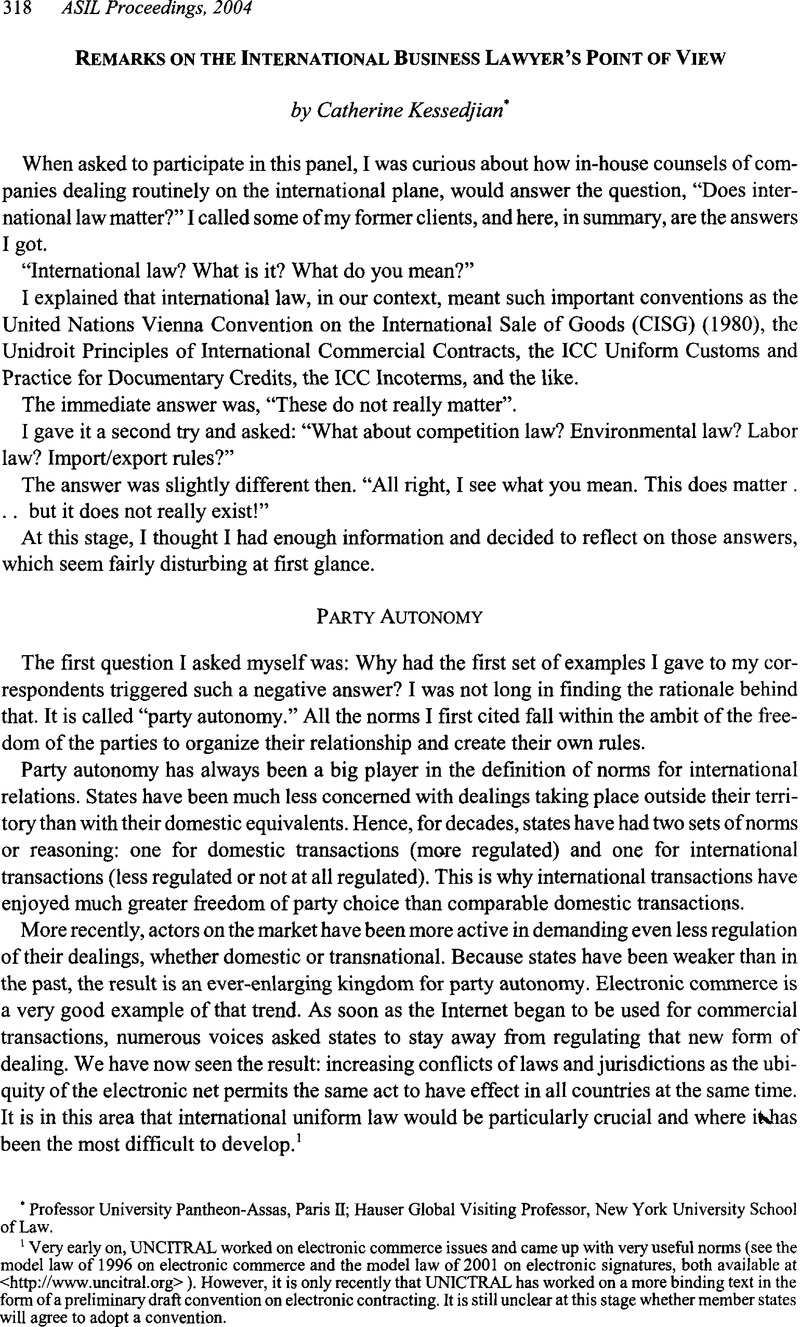No CrossRef data available.
Article contents
Remarks on the International Business Lawyer’s Point of View
Published online by Cambridge University Press: 28 February 2017
Abstract

- Type
- Does International Law Matter?
- Information
- Copyright
- Copyright © American Society of International Law 2004
References
1 Very early on, UNCITRAL worked on electronic commerce issues and came up with very useful norms (see the model law of 1996 on electronic commerce and the model law of 2001 on electronic signatures, both available at <http://www.uncitral.org>). However, it is only recently that UNICTRAL has worked on a more binding text in the form of a preliminary draft convention on electronic contracting. It is still unclear at this stage whether member states will agree to adopt a convention.
2 The terminology varies greatly from one legal system to the other, but the underlying philosophy is that parties cannot override certain norms based on and geared toward protecting certain fundamental values of the society for which they are adopted, whether they are social, political, or economic values.
3 CISG was adopted in 1980. As of April 2004, it had 63 states parties, including some of the biggest actors in transnational economic relations, the United States and most of the countries in the European Union. In early 2004 Korea became a party, as of March 1, 2005.
4 Not all matters excluded from international conventions like the CISG are covered by public policy norms, but sometimes these matters are excluded because they present special difficulties or states want to protect certain values.
5 Party autonomy was traditionally excluded, in whole or in part, from certain areas of the law (securities or real property). Nowadays it is not uncommon to see party autonomy play a large role in these areas. The latest Hague Convention on the Law Applicable to Certain Rights in Respect of Securities Held with an Intermediary, adopted in December 2003, is a good example of that evolution.
6 Even in these highly specialized fields, the problems we have encountered in practice have had unsatisfactory answers in international law (notably, insufficiency of funds or lack of recognized jurisdictional rules in courts).
7 At the time we write, we are still expecting the decision of the Ninth Circuit in the United States, where the case was heard in December 2002. At the request of Yahoo! Inc., the district court decided that the French decisions could not have effect in California because they directly contravened constitutional rights under the First Amendment to the U.S. Constitution.
8 The OECD guidelines and recommendations have been useful in that respect.
9 In her recent book, Anne-Marie Slaughter calls such networks “governmental networks.” This is a short-hand expression that does not describe the real nature of these networks. No government as such is involved in them. They are formed essentially between individuals who may not even represent the administration for which they work. The legal status of these networks is very unclear; they correspond to no category known in either domestic or international law.
10 Created in 2002, its Web site is <http://www.internationalcompetitionnetwork.org>.
11 Contrary to its clear announcement upon formation, the ICN has failed to take civil society on board and civil society representatives have very little say during ICN meetings. Notably, the 2004 meeting in Seoul was open only to members and by invitation.
12 This is a particularly difficult issue. All international organizations claim they work in the open and apply principles of transparency. However, transparency means nothing in and of itself. It is only as good as the actual methods used to make sure that all interested are represented, not just the big players. We must also make sure that governments continue to act as arbiters among conflicting interests in society. Because we are in a world in the new ways and means to go about creating international law. This, in my view, is the challenge of the twenty-first century.




